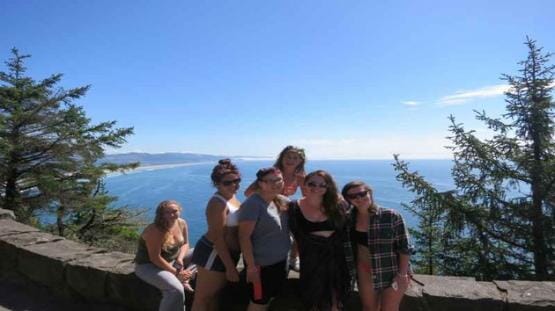Helping individuals apply what they have learned in a residential facility to everyday life and striving everyday to be their last treatment experience.
ABOUT OREGON TRAIL RECOVERY
Located seven miles south of Portland, Ore., in the small city of Milwaukie, Oregon Trail Recovery offers long-term outpatient programming and sober living facilities for men and women who have already passed through a residential treatment program. Clinical detox is also provided if necessary.
TREATMENT & ASSESSMENT
Individuals must call for a phone assessment in order to be admitted to treatment. Programs are available in durations of three, six, and nine months, and men and women are treated on separate pathways.
At the beginning of treatment, all residents participate in a partial hospitalization program (PHP). All clients are required to find work, study opportunities, or volunteer work during their stay; once they’ve secured such work, they step down to participate in five evening groups per week. Clients attend six to 10 hours per week of group therapy and one hour or more a week of individual therapy. As they progress through treatment, clients gradually step down to less intensive levels of care, with some ultimately participating in one weekly group session and one weekly individual session.
Oregon Trail Recovery is a 12-step-based facility, and all clients are required to actively work with a sponsor and attend 12-step meetings throughout treatment. Alongside 12-step participation, the program uses evidence-based therapies such as cognitive behavioral therapy (CBT), dialectical behavior therapy (DBT), mindfulness, and Seeking Safety. The center also prides itself on offering wilderness and adventure therapies and excursions, and holistic options such as art therapy and Native American spiritual ceremonies.
Oregon Trail Recovery’s program is strongly focused on teaching residents life skills that will enable them to find work and places to live and have fun in sobriety. Education assistance is also available. Those who wish to transition to the facility’s sober living facility must apply. Here, clients use the skills they practiced in treatment and learn how to work together as a household.
Assistance with additional relapse prevention and aftercare placement is discussed during one-on-one sessions.
STAFF CREDENTIALS
A medical director comes to the site twice per week, and the team also includes master’s level therapists and counselors.
ACCOMMODATIONS & AMENITIES
Oregon Trail Recovery offers up to 50 beds, with some private rooms available. The cost of treatment includes food, access to laundry services, bus passes, and any excursions the group takes.
WHAT ALUMNI SAY
Of the four alumni reviews submitted to Best-rehabs.com to date, two were positive and three were negative, with ratings of the facility’s treatment effectiveness averaging three out of five stars, based on four ratings.
“This place is awful. The women are treated completely different from the men,” alum S.B. wrote simply, to which the facility responded that each client follows an individualized treatment plan that’s tailored to their needs, but that “the rules are the same for everyone.”
Alum A.A. offered a slightly different critique: “The people who run this place are power hungry, greedy, and micromanaging,” they wrote, and described having to leave the facility, along with many fellow clients. The facility responded: “We also have never had a mass discharge of clients due to clients leaving against medical advice.”
Alum M.B. also stepped up to defend the facility, writing: “This center wants the group as a whole to be accountable some people in early recovery hate this and those clients do not last.”
WHAT FRIENDS & FAMILY SAY
Of the five reviews submitted to Best-rehabs.com to date, three were generally positive while two were negative. “My daughter was there 3 months and did very well,” Tom wrote, but went on to claim that his daughter would likely have to file for bankruptcy owing to what he described as dishonest billing practices.
And J.Y. echoed alum S.B. by citing poor treatment of female clients. “I did not like the… staff, medical director unqualified… Treat patients like inmates. Put them on the streets with no warning,” J.Y. added.
WHAT STAFF SAY
The single staffer polled by Best-rehabs.com to date gave very positive feedback. “I work for OTR and was the second client I am over three years sober because of this treatment center,” C.B. wrote, giving the center five out of five stars for the overall effectiveness of its treatment.
FINANCING
Treatment costs $5,200 for a month, or $15,600 for 90 days, and the center accepts private insurance on an out-of-network basis, as well as self-payment. Oregon Trail Recovery also offers financial assistance covering up to 100 percent of the cost of treatment.
